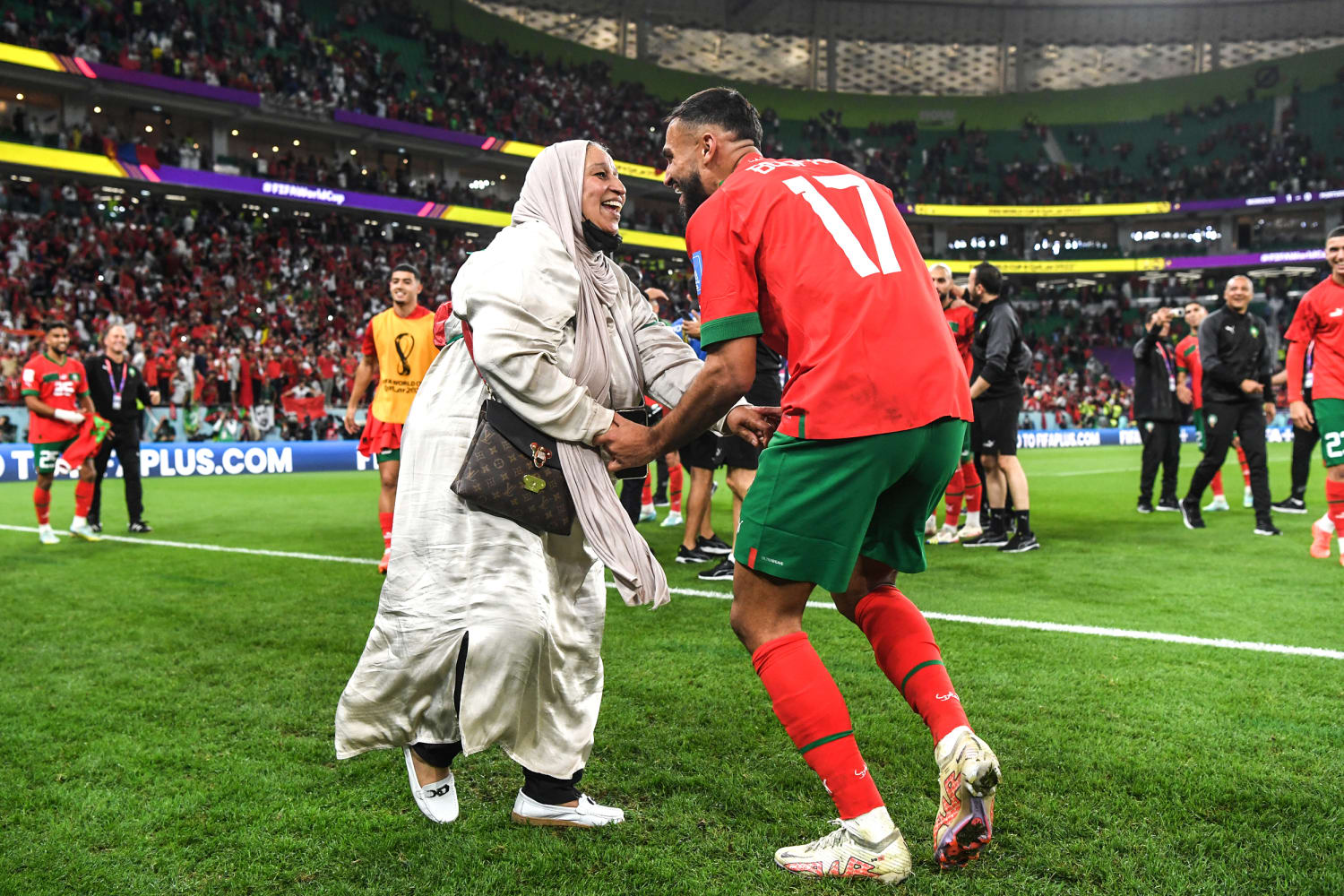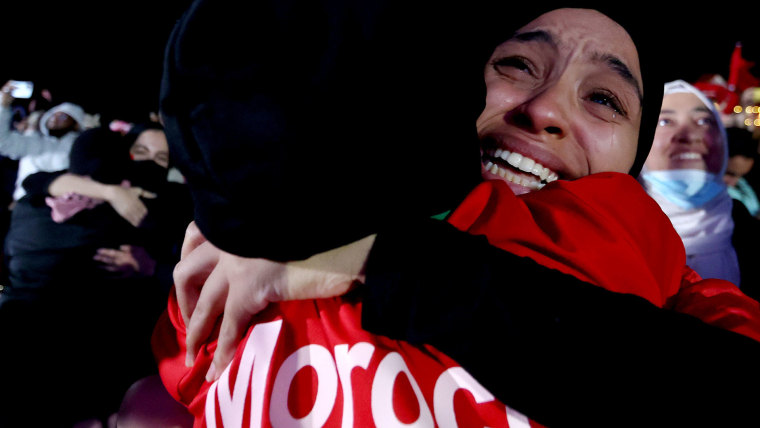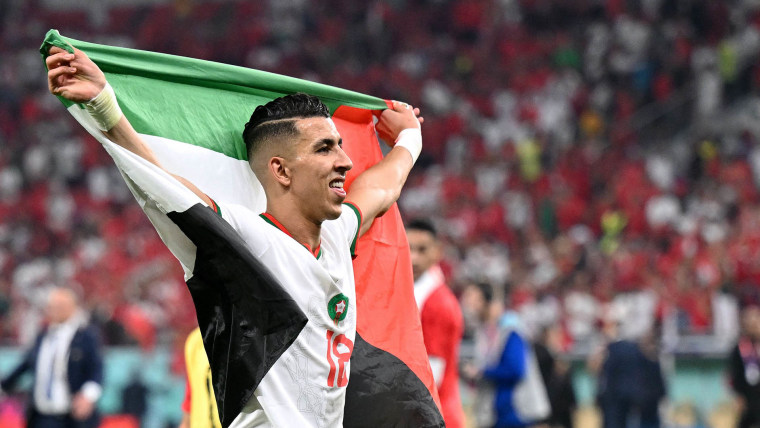The iconic image of the 2022 World Cup may well be Morocco’s Sofiane Boufal dancing with his mum after his team’s brilliant upset victory over Portugal in the quarterfinals. It was a statement of pride and of priorities, a reminder that, as the mother of the great Zinedine Zidane is reputed to have once said, “Some things are bigger than football.” It was also a moment of unbridled joy, as the Atlas Lions beat another of Morocco’s former colonizers — and cued up a symbolic reckoning with the last of its colonial overlords, France. The geopolitical implications of Wednesday’s semifinal are almost too on the nose.
The first World Cup tournament staged in the Arab world has captured, in symbolic form, an emerging multipolar reality in which the post-1945 hegemony of Western powers has receded in the face of challenges from multiple quarters: Morocco has reached the semifinals, and Saudi Arabia humiliated one of the tournament favorites, Argentina, in the group stage, while Tunisia did the same to its former colonizer, France. Japan beat heavyweights Germany and Spain. The traditional power (im)balance in global soccer — as in geopolitics — can no longer be taken for granted.
Boufal and his mother — like the majority of Morocco’s players and coaches — live in European cities, part of that continent’s vast marginalized and embattled migrant underclass. She wore hijab, something she would be barred from doing were she a teacher or a public servant in France.
In fact, as many as 5 million Moroccans live abroad, mostly in Europe. And they celebrated the team’s victories in raucous street celebrations in the cities of France, Spain, Belgium, the Netherlands and beyond. For them — and for so many other migrants from the Arab world or Africa, driven by decades of desperation in their home countries to risk everything to reach Europe, only to suffer abuse and contempt — it was an electrifying milestone.
As fullback Achraf Hakimi reportedly said after he converted the winning penalty against his native Spain: “My mother cleaned the houses, and my father was a street vendor. We come from a modest family that struggled to earn a living. Today I fight every day for them. They sacrificed themselves for me.”
Similarly revealing has been the show of Palestinian pride in Qatar. There was no Palestinian team at the World Cup, and yet the Palestinian flag was everywhere — not only in the hands of celebrating Moroccan players and fans, but also at every game and on the streets of Doha. These displays shocked some Israeli journalists, who had been assured by their own government that its U.S.-brokered Abraham Accords with Morocco and other Arab states signaled that the Arab world had relinquished any pretense of advocacy for Palestinian rights.
But soccer creates its own form of civil society, and in a region where civil society has been largely suppressed by authoritarians, what this World Cup has made clear is that the Arab publics are not willing to follow their unelected leaders in accepting the humiliation of accepting what leading human rights organizations have called Israel’s apartheid system.
By waving that Palestinian flag, Moroccan fans and players expressed a very public dissent from the choices of their government and of Western powers and other Arab autocrats to abandon the Palestinians to their fate. And by continuing to advance, Morocco has kept sustained attention on these issues, even as its players prove they more than deserve to be playing on this prestigious stage.
Morocco’s prowess as the first African team to make the semifinals of the World Cup brings us ever closerto fulfilling soccer icon Pelé’s prophecy that an African team would win the World Cup, albeit two decades later than the Brazilian legend had expected.
Morocco’s prowess as the first African team to make the semifinals of the World Cup brings us ever closer to fulfilling soccer icon Pelé’s prophecy.
And that prophecy would most likely not be fulfilled without soccer’s globalization. The world’s top players have for decades all played in Europe’s elite leagues, and the “technology” of the game (tactics, coaching and organization) have reached every part of the globe.
Indeed, this was the first World Cup in which all five African teams were coached by African coaches, rather than by European journeymen. On that score, Morocco’s coach, Walid Regragui, appears to have made an exceptional difference.
Morocco counterattacks with elegance. The team’s strategy suggests its coach has rewritten the playbook that long recommended African teams play pessimistic defensive football, hoping for a lucky break. True, Morocco’s stingy defense has been a feature of its progress, but the team’s defensive record has been achieved by retaining possession and one-touch passing its way out of trouble at the back with a confidence that contrasts with the instinct to simply play long clearances. Passing has set up lightning transitions on the counterattack, in which one-touch flicks and dribbling runs create scoring opportunities. Skills, then, but also smiles: These Atlas Lions actually seem to be enjoying themselves. And Regragui is showing his peers across Africa and Europe the magic that can be achieved by releasing the tactical handbrake.
It’s not all feel-good underdogs and gracious victors, of course. Many of the knockout-stage games of this tournament have been fraught and fractious displays of ugly football and even uglier petulance. But don’t expect more of that when Morocco faces France. Whatever the final score, I predict we’ll see heartwarming expressions of fraternity and mutual respect among the players of both sides. After all, so many of France’s stars, like Morocco’s, are the children of African migrants who’ve grown up in Europe’s ghettos. Whatever “national” shirts they wear, it’s not hard for them to see themselves, and their own mothers, in one another.
Source: | This article originally belongs to Nbcnews.com











